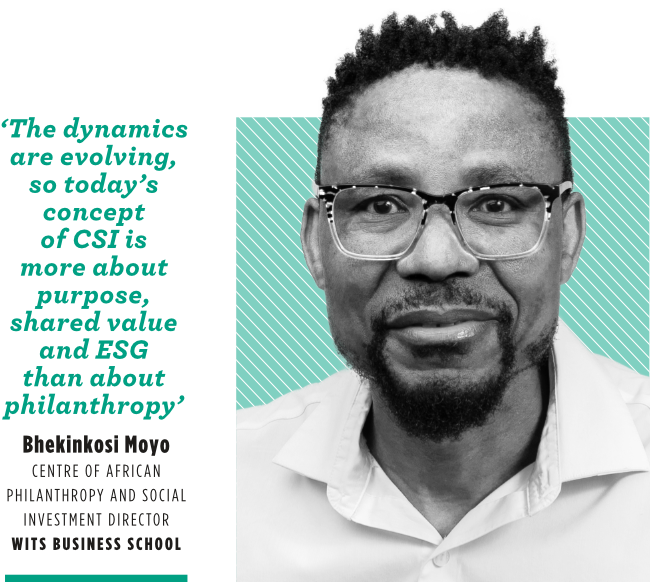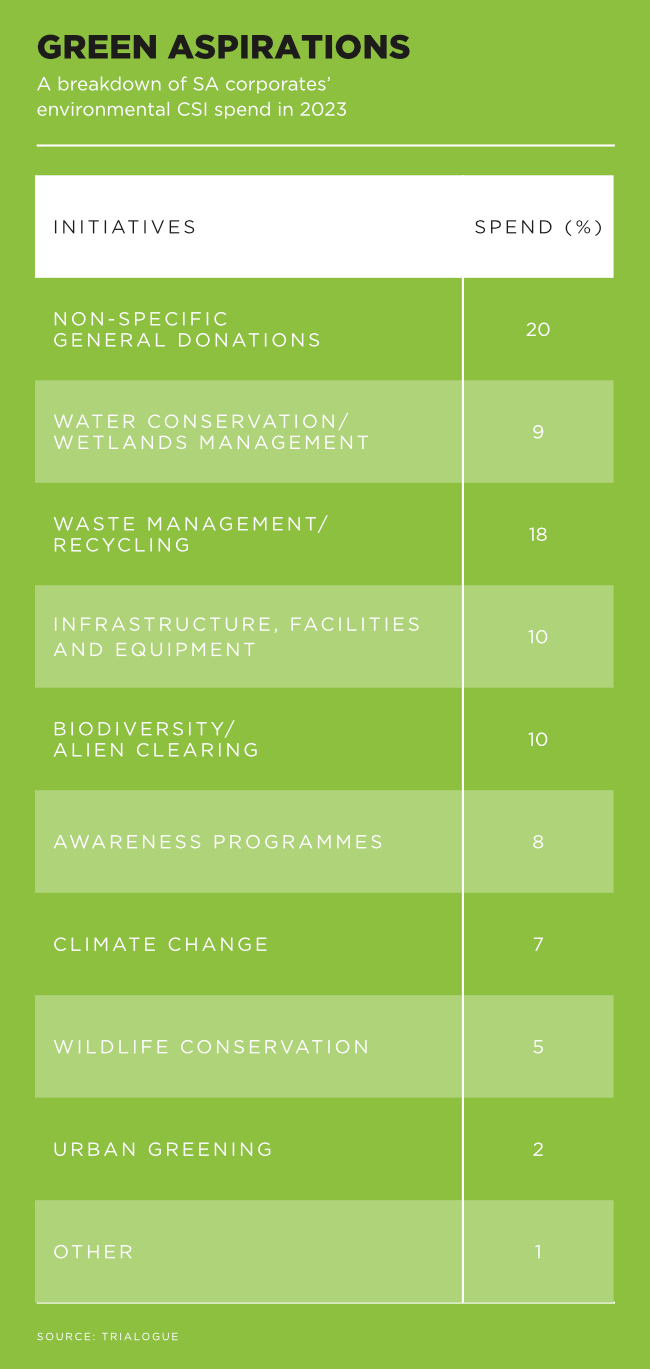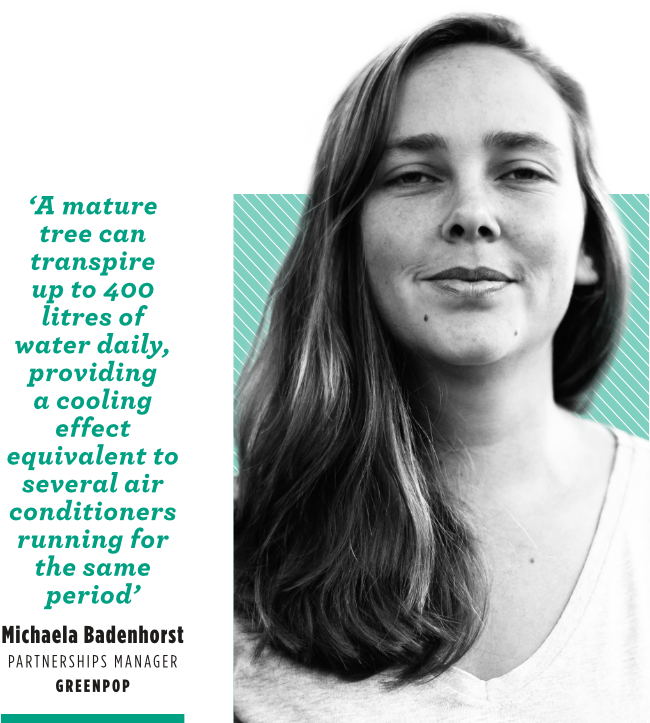‘To do more for the world than the world does for you – that is success.’ When US carmaker Henry Ford came up with these words a century ago, he couldn’t have imagined that they would be quoted as a guiding principle for the CSI of Ford’s operations. The car manufacturer’s Ford Wildlife Foundation, established in 2014, currently supports 29 environmental and wildlife conservation, research and education projects in Southern Africa. There is, for example, the Black Rhino Range Expansion project (which relocates rhinos to create new populations); the Overberg Renosterveld Conservation project (which works with farmers to protect and manage this endangered ecosystem); and the Southern Ground Hornbill project (which harvests and rears chicks to prevent their extinction).
Ford SA is among the 53% of companies in SA that, according to sustainability consultancy Trialogue, reported making non-cash CSI donations in 2023 (in the form of goods, services or volunteering time). In the case of the car manufacturer, non-cash giving means providing locally made Ford Ranger double cab vehicles to the selected CSI projects for the duration of two years. Fossil fuel emissions aside, the Ford Wildlife Trust says its sponsored bakkies provide ‘crucial mobility to partner organisations, allowing them to reach remote areas and allocate their financial resources directly to conservation efforts rather than vehicle purchases and maintenance’.
It’s worth noting that the support for environmental causes through CSI has been decreasing over recent years, according to Trialogue’s annual Business in Society Handbook. In 2023, more than a third of companies (37%) in SA supported environmental causes through their CSI, but this translates to just 3% of CSI expenditure on average. ‘Non-specific general donations received the largest share of CSI spend in the environmental sector (20%), with water conservation and wetlands management (19%) and waste management and recycling (18%) receiving similar portions of average spend in 2023. Climate change (7%) and wildlife conservation (5%) received lower average spend in 2023 than in 2022 (11% and 14% respectively),’ reports the handbook.
Trialogue indicates that the decreasing CSI spend on the environment is ‘most likely’ due to ‘core business focusing more on mitigating its environmental impact’. However, this doesn’t mean that companies now focus less on environmental aspects; quite the opposite. Many have moved them from their CSI programmes into their broader sustainability or ESG strategy – in other words, from the periphery to the forefront of their business.
‘CSI is still extremely important in the South African context,’ says Bhekinkosi Moyo, director of the Centre of African Philanthropy and Social Investment at Wits Business School. ‘The dynamics are evolving, so today’s concept of CSI is more about purpose, shared value and ESG than about philanthropy. Companies have started to understand that they require a social licence to operate and a healthy environment in order to run a sustainable business. As a result, they see the value that CSI brings to their business.’
While the bulk of CSI goes into social programmes, notably education, community development and entrepreneurship, Moyo highlights the significance of environmental CSI. ‘Without doubt, South Africa has many deep-rooted social challenges that need to be addressed, but at the same time companies mustn’t forget about environmental issues such as climate change,’ he says.
‘In my view it’s not a question of if but of when each business in South Africa will be affected by climate change. It’s already happening with extreme weather, such as storms, floods, drought and the destruction of infrastructure, so companies of all sizes will increasingly have to invest in addressing environmental issues.’
A popular way for corporates to get involved in ‘green’ CSI is by supporting tree-planting projects. Globally, the Green Belt Movement (founded by Kenyan Nobel laureate Wangari Maathai) and Trees for the Future (which integrates tree planting in Africa with sustainable farming practices to improve soil health and food security) have made headlines, while local NGOs include Food and Trees for Africa, the Wildlands Conservation Trust, WWF SA and Greenpop.
‘Over the past 14 years, our approach has evolved significantly,’ says Michaela Badenhorst, partnerships manager at Greenpop, which focuses on sustainable urban greening and forest restoration projects, while spreading environmental awareness and encouraging people to become environmental stewards. More than 90 businesses support the NGO’s holistic ecosystem restoration work in a way that aligns with their own ESG and internal sustainability goals. ‘Each month our “pledge partners” plant trees with us based on their unique pledge commitment,’ says Badenhorst. ‘For every R150 they donate towards our Forest for Life programme they not only watch their tree tally grow but they are also supporting a whole host of interventions that go far beyond the trees too.’
BOS Ice Tea, for example, has committed to plant one tree for every 2 000 units sold. To date, the company has planted more than 37 000 indigenous trees and frequently joined Greenpop at the restoration sites and gardens. In another collaboration, the NGO is helping Heineken SA to transform under-resourced communities across the country by creating vibrant, sustainable urban green spaces while addressing key environmental challenges. The multi-year Heineken Green Zones initiative will establish 10 green zones with grassy recreation areas, biodiversity gardens and waste-reduction art installations. ‘These inclusive spaces are complemented by community clean-up events targeting glass waste, aligning with Heineken’s broader campaign to introduce 650 ml returnable glass bottles,’ says Badenhorst.
Urban greening efforts such as these are vital in mitigating global warming in cities, because trees have a cooling effect by creating shade and by releasing vapour through their leaves. ‘A mature tree can transpire up to 400 litres of water daily, providing a cooling effect equivalent to several air conditioners running for the same period,’ says Badenhorst. But planting the ‘wrong’ species can disrupt ecosystems, drain water resources or outcompete indigenous plants such as fynbos or grasslands.
Indigenous trees are often the best choice – they’ve evolved to thrive in their specific regions, supporting local wildlife and maintaining ecological balance, according to Greenpop. Timing is also critical. Planting at the right time of year, typically in the lead-up to the rainy season, ensures that trees have the water they need to establish strong roots and grow healthy. By planting the right trees, in the right place, at the right time, ‘we can create resilient landscapes that support both people and nature’, according to the organisation.
As Greenpop doesn’t use ‘seed bombs’, plantation forestry, drone planting or invasive species, it says its progress may be slower than other tree-planting projects, but it will eventually have a more sustainable impact.
Successful strategic CSI projects tend to have multi-year time frames, often decades, to achieve measurable and lasting developmental impact that also has benefits for the business itself. Moyo explains that strategic CSI intends to address more complex developmental issues – in fact entire ‘ecosystems’ that involve managing relationships and co-ordinate activities – in contrast to once-off, short-term initiatives. Because of the interconnectedness of today’s societal, environmental and economic challenges, strategic CSI tends to not limit itself to addressing one issue but cuts across sectors.
Moyo cites the crosscutting, shared-value Sappi Khulisa programme – winner of Trialogue’s 2023 Strategic CSI Award (for which the professor served on the judging panel). The project is transformational as it creates economic value for both the company and the beneficiaries while addressing real social needs and promoting environmental sustainability.
Sappi is a SA pulp and paper company with global operations, which underlines that – being a renewable resource company – biodiversity is the foundation of its business. Khulisa is its flagship enterprise and supplier development scheme for emerging timber farmers. It has evolved from a straightforward CSI programme into an integral, thriving division in the company’s supply chain. Launched in 1983 as a CSI outreach project, it started modestly by supporting three subsistence farmers.
Today, 29 permanent Sappi staff members support more than 4 200 growers in KwaZulu-Natal, Mpumalanga and the Eastern Cape. The growers receive sponsored seedlings, technical advice and training, loans and guaranteed access to market in an industry with generally high cost-of-entry barriers. In return, Khulisa growers supply high-quality fibre to Sappi (more than 217 000 tons of timber worth about R184 million in 2022).
‘Sappi Khulisa is no longer a CSI project, it’s part of our core business,’ says Dutliff Smith, business manager of forestry operations.
At Nedbank, CSI has also grown into something much bigger – from starting as SA’s pioneer in environmentally focused CSI to building its corporate identity on being the ‘green’ bank. In 1990, the WWF Nedbank Green Trust was launched and funded through the bank’s Green Affinity loyalty programme. The trust has raised more than R350 million for nature conversation projects. The bank says that in the early days its projects focused on ‘glamorous’ wildlife species, such as cheetah and rhino, before expanding its reach to ‘span landscapes, waterscapes, seascapes and foodscapes’. In 2021, Nedbank revised its CSI strategy to focus on four key areas of the green economy – agriculture, water, energy and waste. All these areas are critical to the economy, the well-being of communities, the environment and to Nedbank’s clientele and its reputation as SA’s green bank.
It’s clear that CSI has come a long way and continues to evolve, driven by good business sense and the sentiment of wanting to do more for the world than the world does for you.











